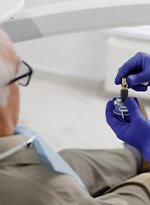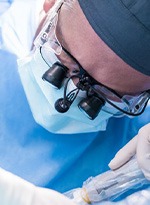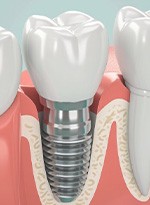Dental Implants – Norwood, MA
A Long-Term Solution for Tooth Loss

Why Choose Norwood Dental Care for Dental Implants?
- Partnered with Expert Oral Surgeons in the Area
- Father-and-Son Dental Team
- Affordable Dental Financing Options
What Are Dental Implants?

While other tooth replacements merely rest on the gums or remaining teeth, dental implants are embedded in the jawbone where your teeth’s roots used to be. The implant itself is a tiny titanium post that merges with the bone surrounding it in a process called osseointegration. As a result, the implant can support a dental crown, bridge, or even a full denture for many years or decades to come.
The 4-Step Dental Implant Process

With their lifelike stability, durability, and longevity, it’s easy to see why dental implants are the pinnacle of tooth replacement options. To make sure this treatment is successful, you can expect the process to have multiple essential steps. Our team will walk you through the entire treatment plan during your initial visit, that way you know what to expect. Until then, here are the four main steps of the dental implant process.
Initial Dental Implant Consultation

First, one of our dentists will meet with you to discuss your candidacy for dental implants and determine what, if any, preparatory work needs to be done. We will need to verify that you are free of any underlying complications that could prove a risk to your treatment results down the road. These preliminary services can involve gum disease treatment, bone grafting, or even tooth extractions—depending on what you need to prepare your mouth for the implant procedure. Once we’ve confirmed that your oral health is in great condition, we can set you up with your surgical appointment.
Dental Implant Surgery

Our team will refer you to one of our trusted local experts to have the dental implant posts surgically positioned into your jawbone. To begin your procedure, your team will first administer a local anesthetic to ensure that you’re completely pain-free during your appointment. They might even provide sedation dentistry so that you’re calm and extra comfortable while undergoing the treatment. Your surgeon will then make a small incision in the gums to reach your jawbone, where they will place your dental implant before suturing the tissue around it. Then, before sending you off, they’ll place a protective cap on the implant so that you can recover comfortably.
Dental Implant Osseointegration & Abutment

Your jawbone will gradually fuse with the implants over three to six months. This is the process known as osseointegration, which is essential for the success of your results. Your dental team will provide you with aftercare guidelines so that you can ensure a smooth recovery. After your implant is properly fused to your jawbone, you’ll return to our office to receive your abutment. We’ll then take impressions of your mouth to send to a lab to create your restoration(s).
Delivery of Dental Implant Restoration(s)

After the implants are sufficiently integrated with your jaw, we can restore them with a customized dental crown, bridge, or denture. We will verify that your restoration or prosthetic is well-fitted and perfectly matches the rest of your mouth. We’ll also confirm that you’re satisfied with the results before letting you go to enjoy your full bite again.
Benefits of Dental Implants

The benefits of dental implants in Norwood are so numerous that it’s easiest to understand them by breaking them down into various categories. Not only will your smile look and feel more lifelike than with any other tooth replacement method, but the long-term results of dental implants will have you glad you made the investment. From an improved bite to a more confident grin, discover some of the advantages that dental implants have over traditional treatments.
Day-to-Day Benefits

- Because your new teeth are anchored in your jawbone, they’re sturdy enough to let you chew all of your favorite foods with ease.
- You’ll also be able to drink hot beverages (coffee, tea, etc.) without worrying about your teeth changing shape as traditional dentures often do.
- You can go about your daily life with the knowledge that your pearly whites will never feel loose, shift around, or fall out of your mouth.
- Denture wearers often feel self-conscious of and limited by their prosthetics. With dental implants in Norwood, however, you’ll feel free to embrace new social opportunities, potentially improving your romantic or even professional life.
Health Benefits

- Bridges and dentures do not stimulate the jawbone. Over time, the bone may weaken and contribute to gum disease or further tooth loss (not to mention a wrinkled, sagging facial appearance). In contrast, dental implants function just like your natural tooth roots, stimulating blood flow to the jawbone every time you bite down or chew.
- Dental implants are self-supporting. They can remain in place without rubbing against the gums (like dentures) or removing healthy tooth structure (like bridges). This means you’re much less likely to experience gum irritation and tooth sensitivity.
- Multiple studies suggest that replacing missing teeth with dental implants may lead to a longer lifespan. Tooth loss is associated with a higher risk of several health conditions, such as heart disease, diabetes, osteoporosis, and Alzheimer’s disease. Because dental implants function like real teeth, they prevent these problems from developing.
Long-Term Benefits

- Caring for dental implants is often as simple as keeping up with regular brushing, flossing, and checkups with your implant dentist in Norwood.
- Even after more than 10 years, dental implants have a success rate of over 95. With the right care and maintenance, your implants could even last for the rest of your life!
- While dental implants have a higher initial cost, they’re actually more cost-effective in the long run. They won’t break down every few years like dentures or bridges. Instead, they’re a one-time investment that should pay for itself over the years in avoided repair/replacement costs.
- You also won’t have to spend money (and time) on additional cleaning products and adhesives.
Who Dental Implants Can Help

No matter how many teeth you’ve lost, dental implants could potentially be the solution that you’ve been hoping for. As an incredibly versatile treatment, we can customize your dental implant treatments based on a variety of different factors. Here’s everything you need to know based on your unique circumstances.
Who Is a Good Candidate for Dental Implants?

Pretty much any healthy adult can get dental implants. Here are the things that we consider when determining if someone makes a good candidate:
- Good overall health: Placing dental implants is a surgical procedure, so you’ll need to be well enough to undergo minor surgery.
- Great oral health: Issues like cavities and gum disease can potentially cause dental implants to fail, so they’ll need to be addressed first.
- Adequate jawbone density: Your jawbone must be strong enough to support dental implants for your treatment to be successful.
Even if you’re not a good candidate initially, you may still be able to get dental implants. Many of our patients need to complete preliminary treatments like tooth extractions, gum disease therapy, or bone grafting before getting dental implants. We’ll help you schedule these preparatory procedures to get you on track for getting a new smile. Then, once you’re a good candidate, we’ll create your dental implant treatment around how many teeth you’re missing.
Missing One Tooth

If you’re missing one tooth, a single, titanium implant and crown are sufficient for replacement. The crown is made entirely from porcelain, a dental ceramic that looks almost exactly like natural teeth.
Missing Multiple Teeth

If you’re missing two to four teeth, a dental bridge can be customized to fit with dental implants. Instead of relying on neighboring teeth to anchor restorations like traditional bridges, implant bridges use two implants on either side to hold up to four teeth at a time.
Missing All Teeth

If a denture is not the direction you’d like to go, implant dentures are the perfect solution. By placing four to six implants strategically throughout the mouth, they can hold an entire arch. This effectively replaces an entire row of teeth while still offering a more stable denture in the process.
Understanding the Cost of Dental Implants

Each patient has different needs when it comes to dental implants; as such, in order to get an accurate idea of what you will ultimately end up paying for your new smile, you will need to have your mouth carefully examined by our team. Keep in mind that while dental implants cost more than other tooth replacement methods, the higher price tag is balanced out by the many benefits that the treatment offers.
Preliminary Treatments & Dental Implant Surgery

Sometimes you may need to pay for additional treatments before receiving dental implants. Common examples include bone grafting and tooth extractions. These procedures aren’t necessary for every patient, but for some, they could be crucial for allowing dental implants to be placed.
The cost of dental implant surgery can vary based on the location of the implant posts as well as other factors. To ensure the best results, we will refer you to a local oral surgeon for this procedure; they’ll give you an explanation of what you can expect to pay.
The Parts of Your Dental Implant

Your dental implants may be used to support a crown, a bridge, or a denture. Each type of prosthesis carries its own price tag. Smaller implant restorations typically equal a smaller cost; as such, you can expect to pay less for a crown than you would for a denture.
The cost of the implant posts themselves can vary depending on the type of material used as well as which brand was chosen. Furthermore, the number of implants matters as well; some patients may need to pay for more implant posts in order to replace all of their missing teeth.
How Dental Implants Can Save You Money

Despite costing more than traditional bridges and dentures, dental implants can potentially prove to be a highly cost-effective option. With dental implants, you don’t have to worry about having them replaced every 5 to 10 years, and there’s no need to buy any special cleaning solutions or adhesives. Additionally, dental implants are very easy to take care of, which can improve your chances of avoiding gum disease and other oral health issues that you would have to pay to treat.
Does My Dental Insurance Cover Dental Implants?

Many dental insurance plans do not pay for the actual dental implant posts, but they may be willing to partially cover the final restoration or any preliminary treatments that are deemed necessary. You don’t want to make any assumptions where dental insurance is concerned, so take the time to double-check your benefits. Our team can file your insurance claims for you and explain how you can use your coverage to the fullest.
Making Dental Implants Affordable

CareCredit financing can take some of the stress out of paying for dental implants. You can cover the cost in a series of monthly payments with little interest (and in some cases, no interest). Talk to our team for more information about this option.
Dental Emergency FAQs

No one ever expects to need an emergency dentist in Norwood, but we are here to help make a stressful day easier. After addressing any pain and examining your mouth, your dentist will explain everything and ease any concerns. While you wait for your appointment, here are the answers to the most frequently asked questions.
How should I sleep with a toothache?
If you have a toothache, you don’t have to toss and turn all night. It’s best to avoid hot or cold foods and drinks to prevent sensitivity. Don’t eat any hard or chewy foods for dinner. After brushing and flossing, rinse your mouth with salt water to kill bacteria while reducing pain and inflammation. Take an OTC pain reliever before heading to bed. Sleep with your pillow elevated to prevent blood from pooling in your head, which can cause your tooth to throb.
Do chipped teeth heal?
Your enamel is the hardest substance in your body. It’s even harder than some metals, but it won't regenerate. Once it is gone, it is gone for good, so a chipped tooth won’t heal. At best, it may remineralize, but it’s important to contact a dentist no matter how insignificant the damage appears. Minor chips can often be repaired using composite resin for a quick, natural-looking solution.
Will a toothache go away on its own?
Contrary to common belief, an occasional toothache isn’t normal. While discomfort caused by the surrounding gum tissue may go away, tooth pain is a dental emergency in Norwood. Your discomfort is a symptom of an underlying problem, like decay, fractures, infection, or a failing restoration. Without any care, a minor issue can turn into a dental emergency. Don’t ignore your toothache because it won’t go away without treatment from a dentist. If your pain does resolve over time, it may be too late to save your tooth.
Do I need to see a dentist if my chipped tooth doesn’t hurt?
Yes, you should still see a dentist if your chipped tooth doesn’t hurt. The structure of your tooth will be compromised. One wrong bite can lead to a serious break or fracture. Not to mention, your tooth’s defense system will be weakened, leaving it vulnerable to bacteria. If the chip is minor and you aren’t having any pain, you can wait for your dentist’s next availability, but don’t delay having it repaired for too long.
Can I use superglue to fix my broken denture?
Superglue is great to have around the home for quick fixes, but it’s not the best solution to repair your dentures. It can contain toxic chemicals or cause allergic reactions. Not to mention, it won’t hold for long because superglue doesn’t do well in moist environments, like your mouth. Instead, leave the mending to professionals. We know you can’t go without your teeth, so we will get you into the office quickly for repairs or replacements. Use an old denture in the meantime, if possible.
Maintaining & Caring for Your Dental Implants

As long as you take good care of your dental implants, they can easily last for 30 years. In fact, with the right maintenance, they could even last for the rest of your life. However, although your new teeth can be cared for almost exactly like your old teeth, they still require some degree of maintenance. Here are some simple tips for dental implant care in Norwood:
Make Oral Hygiene a Priority

Just because dental implants can’t get cavities doesn’t mean you can slack off on your oral hygiene. Poor oral hygiene can cause health problems like gum disease, which may lead to dental implant failure.
To prevent this, you should essentially brush and floss your implants like you did your original teeth. if you have an implant bridge, you may want to invest in extra tools like water flossers or interdental brushes to ensure the area stays clean. Rinsing with an antibacterial mouthwash after brushing and flossing can also help.
Eat a Healthy Diet

Dental implants renew almost all of the chewing power you had before tooth loss, allowing you to enjoy a full, nutritious diet. However, overindulging in foods that are too sugary, sticky, or crunchy can damage your implants or even loosen the restoration. Also, get plenty of vitamin C to promote healthy gums and calcium to keep your jawbone strong.
Break Bad Habits

Getting dental implants in Norwood is a great reason to quit harmful oral habits, such as smoking. Tobacco slows the healing process, which may interfere with your implant’s ability to successfully fuse with your jawbone. It also doubles your risk of developing gum disease, which may contribute to implant failure. You should also avoid chewing on hard objects (ice, pens, fingernails, etc.) and using your teeth as tools to open packages or bottles to prevent damage to your implant or restoration.
Protect Your Dental Implants

Your dental implants are quite durable, but they’re not indestructible. To shield your new teeth from injury, wear a mouthguard whenever you play contact sports like football. Similarly, wear a nightguard if you suffer from bruxism (chronic nighttime teeth grinding) to protect your dental implants from excessive wear and tear.
Schedule Regular Dental Checkups

Even if you have no natural teeth left, routine dental checkups are still important if you have dental implants. Visiting us at least twice a year allows our team to detect any signs of trouble with your implants right away, increasing the chances of successful treatment. Plus, we can professionally clean any remaining teeth you may have.
